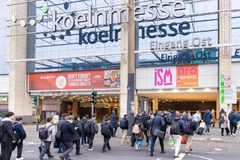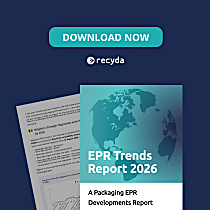Circular economy dreams? New plastic legislation threatened by low recyclate availability

27 Jun 2022 --- Circular economy regulations for plastic food packaging are becoming increasingly stringent, but the desperately low availability of food-grade recyclate has left businesses in the Western world struggling to meet recycled content targets – sometimes at the expense of financial penalties.
PackagingInsights speaks to trade associations and leading packaging suppliers to understand how more public investment in recycling infrastructure and a focus on recycle-by-design packaging can help drive the circular plastics economy.
Closing the bottle loop
The EU has set ambitious targets to recycle 50% of all plastic waste by 2025 and quadruple sorting and recycling capacity by 2030 (compared to 2015). Meanwhile, all packaging materials must be reusable or recyclable by 2030. It has also set specific targets for PET bottles, stipulating a 90% collection rate by 2029 and a minimum of 25% recycled content from 2025.

However, a recent Natural Mineral Waters Europe (NMWE) report warned the EU would fall short of its recycling targets unless “dramatic” changes are implemented, including establishing a mechanism whereby the beverage industry has priority access to recycled PET (rPET). The warning came amid concerns that other industries – notably textiles and automotive – increasingly “downcycle” rPET into lower grade applications, draining the recyclate supply.
“It’s a pity that the EU Single Use Plastics Directive laid down targets for the incorporation of rPET into new beverage bottles without providing beverage producers with the necessary enabling measures, in particular, security of rPET supply,” says NMWE secretary-general Patricia Fosselard.
“EU authorities are aware of the resulting challenges for our industry. The upcoming revision of the Packaging and Packaging Waste Directive legislation will likely set mandatory recycled content targets for additional sectors. It will afford a good opportunity to introduce priority access for all obligated sectors under the new legislation,” she adds.
According to Petcore Europe, 2 out of 3 PET bottles are collected for recycling in Europe. In some countries, the collection rate is more than 90%, mainly due to the successful implementation of Deposit Return Schemes (DRS). The trade association has called for increased public access to DRS and a ban on the landfilling and incineration of PET bottles, which has already been imposed in some Member States. The European soft drinks industry has called for priority access to rPET.
The European soft drinks industry has called for priority access to rPET.
Boosting flexible recyclate
Flexible plastic packaging, which is used for packaging approximately 40% of all food items in the EU, is not yet widely recycled. Major food companies have called for governments to impose mandatory collections and invest in more effective sorting and recycling infrastructure to improve recyclate availability.
In January, PepsiCo Europe announced plans to eliminate virgin fossil-based plastic in all its chip bags by 2030. The F&B giant proposes using 100% recycled or renewable plastic instead, thereby reducing the packaging’s greenhouse gasses by up to 40%.
Silviu Popovici, PepsiCo Europe’s CEO, stressed during the announcement that the industry now requires public policy enablers to establish “an appropriate regulatory landscape” to help companies like PepsiCo achieve their circularity targets.
“Alongside collaborating on and financing the development of effective waste collection systems through Extended Producer Responsibility (EPR), PepsiCo believes in the need for higher recycling targets for plastic overall and a specific target for flexibles to drive collection, sorting and recycling. These targets should include mandatory collection and the better sorting of flexible plastics,” she explains.
“There should also be a ban on landfill and incineration across Europe, and clear and harmonized sorting instructions for consumers. Recognition and support for various mechanical and advanced recycling technologies will also be key.” PepsiCo Europe has developed a monomaterial chips bag for improved recyclability.
PepsiCo Europe has developed a monomaterial chips bag for improved recyclability.
Recycle-by-design
The rising demand for recycled food-grade plastic comes amid warnings from Plastics Recyclers Europe that recyclers are experiencing shortages of sorted plastic waste, which could slow down the transition toward a circular plastics economy in the EU.
“Recent EU policy and global developments have boosted massive investments in the plastic recycling capacities on the continent,” explains Ton Emans, Plastics Recyclers Europe’s president. “In 2020, the plastic recycling industry invested €1.5 billion (US$1.56 billion), which translates into 1.1 Mt additional installed capacity when compared to the previous year, and a total of €4.9 billion (US$5 billion) of investments since 2017.”
“However, without stable, high-quality input materials, the industry’s efforts to reach the new recycling targets might be hindered. Robust sorting and collection infrastructure is a must to increase stable feedstocks for European recyclers.”
Packaging suppliers can help drive the circular transition with recycle-by-design packaging. “Design for recycling stands as an essential measure to accomplish circular life for plastics and contributes toward diverting plastics away from landfills and incineration plants. Recyclability leads to a more efficient recycling process, higher quality recycled material, and eventually enables its uptake in a wide range of high-value, beyond-the-niche products,” adds Emans.
PepsiCo Europe recognizes that recycle-by-design solutions are integral to increasing recycling levels. It has confirmed a move to materials that will make its bags easier to recycle, leveraging design technology to create a simpler, monomaterial bag structure. Many businesses are choosing to pay the UK plastic tax because recyclate is too expensive.
Many businesses are choosing to pay the UK plastic tax because recyclate is too expensive.
An impossible tax
In the UK, recycled food-grade plastic shortages have left food businesses struggling to comply with the new UK Plastic Packaging Tax. Introduced in April this year, the law imposes a £200 (US$247) per metric ton levy on producers or importers failing to meet the minimum requirement of 30% recycled plastic in new plastic packaging.
Reports have surfaced that the high demand and low availability of food-grade plastic have made paying the tax more cost-effective than incorporating recyclate in many applications. The situation is made worse by the country’s disjointed collection systems and the government’s refusal to guarantee that funds generated through the tax will be put toward improving recycling infrastructure.
“The availability of post-consumer recyclate (PCR) cannot keep up with the demand,” highlights Andrew Smith, head of sales at film specialist Camvac. “One of the challenges for some suppliers is that after developing the film capabilities, the PCR availability for food-grade use doesn’t match the potential demand. Also, some markets are taking more of the PCR share.”
“The plastic tax has created an additional price increase between 2 and 3%, which is not insignificant,” adds Wayne Hallsworth, sales manager at packaging leader Wipak. “It’s not an option for us to absorb that additional cost, so we’ve passed it on. Our understanding is that our customers are also trying to pass it onto the consumer.”
Meanwhile, Ian Weston, sales manager at flexible packaging supplier Schur Star Systems, says it would be a massive help to the industry if the government recognized and invested in chemical recycling to increase the availability of food-grade recyclate.
“But we also need some form of ‘normal’ for recycling. We have 333 councils in the UK, and not two of them have the same recycling policy. Let’s get some uniformity across the country to give people a better idea of how to recycle and manufacturers something they can aim at,” he explains. New York has introduced a “polluter pays” bill but industry resistance is expected.
New York has introduced a “polluter pays” bill but industry resistance is expected.
Polluter pays principle
Extended Producer Responsibility (EPR) – based on the “polluter pays” principle in which companies are required to contribute financially toward waste management and recycling – is increasingly prevalent worldwide. Notably, the US State of New York recently introduced two bills to combat over-packaging, poor recycling rates and litter issues, including an EPR program.
Assemblyman Steve Englebright, Chair of the New York State Assembly Environmental Conservation Committee, who introduced the bills on May 5, said that the proposals have a “good chance of passing” and a “good deal of momentum that is positive.” He added during a press conference on May 10: “We have plastic now in the bloodstream of many Americans. This [problem] we need to address.”
The EPR program is expected to face fierce industry resistance, experts say. “I absolutely expect industry resistance. Whenever there is real pressure to hold industry accountable, they will always spend money and influence trying to scare legislators away from real, ambitious packaging standards,” says Ryan Carson, a campaign coordinator for the New York Public Interest Research Group.
“However, the industry is not going to regulate itself, as much as corporations may try to persuade our electeds otherwise. We wouldn’t let Exxon set standards on combating climate change. We shouldn’t let the packaging industry dictate how we combat the waste crisis,” he stresses.
By Joshua Poole











